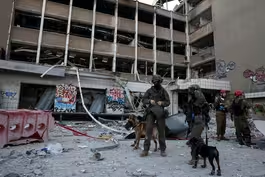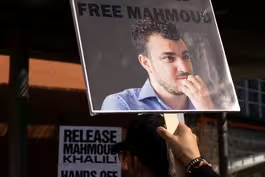
Capehart and Ponnuru on Trump's stance on Iran
Clip: 6/20/2025 | 11m 17sVideo has Closed Captions
Capehart and Ponnuru on Trump's stance on Iran and the rise in political violence
Washington Post associate editor Jonathan Capehart and Ramesh Ponnuru, editor for the National Review, join Geoff Bennett to discuss the week in politics, including attacks on elected state officials, President Trump's consideration of U.S. military involvement in Iran and the debate among Republicans about entering the conflict.
Problems playing video? | Closed Captioning Feedback
Problems playing video? | Closed Captioning Feedback
Major corporate funding for the PBS News Hour is provided by BDO, BNSF, Consumer Cellular, American Cruise Lines, and Raymond James. Funding for the PBS NewsHour Weekend is provided by...

Capehart and Ponnuru on Trump's stance on Iran
Clip: 6/20/2025 | 11m 17sVideo has Closed Captions
Washington Post associate editor Jonathan Capehart and Ramesh Ponnuru, editor for the National Review, join Geoff Bennett to discuss the week in politics, including attacks on elected state officials, President Trump's consideration of U.S. military involvement in Iran and the debate among Republicans about entering the conflict.
Problems playing video? | Closed Captioning Feedback
How to Watch PBS News Hour
PBS News Hour is available to stream on pbs.org and the free PBS App, available on iPhone, Apple TV, Android TV, Android smartphones, Amazon Fire TV, Amazon Fire Tablet, Roku, Samsung Smart TV, and Vizio.
Providing Support for PBS.org
Learn Moreabout PBS online sponsorshipGEOFF BENNETT: The week's political headlines began with attacks on elected state officials here at home and ended with the president considering U.S. military involvement in Iran.
To go deeper on both these issues and more, we turn tonight to the analysis of Capehart and Ponnuru.
That's Washington Post associate editor Jonathan Capehart and Ramesh Ponnuru, editor for "The National Review."
David Brooks is away this evening.
Good to see you gentlemen.
So, President Trump, after reviewing strike options in Iran, says he's pulling back for now.
He's going to decide within two weeks as to whether he will push the U.S. into direct involvement.
Jonathan, what do you make of this brinksmanship?
JONATHAN CAPEHART: Well, one, this idea that I'm going to wait, within two weeks, I will make a decision, this phrase of his, to me, this is the Trump version of setting up a blue-ribbon commission.
You set up a blue-ribbon commission, you send the issue over there, and then you never hear about it again.
There's so many things that President Trump has said we will find out in two weeks that we still haven't heard what he's going to do.
And so, to me, when I heard him say that, I thought for sure that he either doesn't know what he's doing or what he wants to do, and is hoping that within two weeks, this will all get resolved.
But the big question for me is, well, let's say he does decide to get involved, he does decide to use those bunker-buster bombs.
Then what's next?
I keep thinking about, I don't know how many "Top Gun: Maverick" fans there are.
GEOFF BENNETT: One.
JONATHAN CAPEHART: Great, so then exactly what I'm about to say.
GEOFF BENNETT: Right.
JONATHAN CAPEHART: All of this reminds me of the big plot of that movie, which is American Air Force jets have to go in and destroy a nuclear facility in Iran.
Great for Hollywood, but I don't know if that is the wisest course of action for the United States to be involved in.
GEOFF BENNETT: Ramesh, based on what you have seen, do you believe the administration has a coherent, comprehensive strategy for Iran, or is the policy, the approach right now being driven by politics?
RAMESH PONNURU, Senior Editor, "The National Review": Well, I think it's being driven by events.
I don't know that it has a comprehensive strategy, so much as it is reacting to what it's seeing.
And I do think, unlike the normal, well, two weeks from now we will have a health care plan, and that's just a way of punting and you never actually have a health care plan, this is, I think, how far is Israel able to get on its own?
I think that one of the things that we need to think about, though, is what happens to the U.S.-Israel relationship if we have this intervention.
Up until now, it has always been the charge of critics of Israel that Israel drags the United States into war.
And it's never been actually true, but, in this case, if we intervene here, that's exactly what will have happened.
And I do wonder whether that sets back our relationship going forward.
GEOFF BENNETT: And there is the question of, where is Congress in all of this?
The House Democratic leader, Hakeem Jeffries, released that statement today calling on President Trump to refrain from using military force against Iran without explicit approval from Congress.
Democrats don't really matter here because they're powerless in both chambers.
But how should Congress reassert its authority here?
JONATHAN CAPEHART: Yes, where is Congress?
It's incredible that it's the House minority leader, the Democratic leader who is sticking up for the prerogatives of a co-equal branch of government.
Where is Speaker Johnson?
I mean, if the president does this, where is he getting this wartime authority from?
Are they using the AUMF from, what... RAMESH PONNURU: 2001.
JONATHAN CAPEHART: From 2001 for Iraq and Afghanistan?
I mean, so, yes, the leader is raising the right question.
We haven't -- I haven't heard anything from Speaker Johnson any of this.
Or how about the Republicans in control of the Senate, Senate Majority Leader Thune?
Where are they?
RAMESH PONNURU: I agree on the constitutional point... GEOFF BENNETT: That sets you up very well.
Where are they?
(LAUGHTER) RAMESH PONNURU: Well, congressional leaders, and not just recently, have been very good at ducking and covering.
But there's a point beyond the constitutional point, as important as that is, which is that the president should want congressional buy-in to any decision.
If this goes sideways, he needs to be able to say, this was not a unilateral decision on my part, the country, through its entire political system, said yes.
GEOFF BENNETT: Well, the prospect of another war here has ignited a debate within the MAGA wing of the Republican Party, since President Trump ran on avoiding foreign wars.
And I think this was, in many ways, best exemplified by a conversation that Tucker Carlson had with Senator Ted Cruz this past week.
Tucker Carlson is firmly in the anti-war camp.
And this clip that you're about to see picks up with Carlson asking Cruz how many people live in Iran, and Ted Cruz didn't know.
TUCKER CARLSON, Former FOX News Anchor: How could you not know that?
SEN. TED CRUZ (R-TX): I don't sit around memorizing population tables.
TUCKER CARLSON: Well, it's kind of relevant, because you're calling for the overthrow of the government.
SEN. TED CRUZ: Why is it relevant whether it's 90 million or 80 million or 100 million?
Why is that relevant?
TUCKER CARLSON: Well, because, if you don't know anything about the country... SEN. TED CRUZ: I didn't say I don't know anything about the country.
TUCKER CARLSON: OK, what's the ethnic mix of Iran?
SEN. TED CRUZ: They are Persians and predominantly Shia.
TUCKER CARLSON: What percent?
SEN. TED CRUZ: OK, this is cute.
OK. TUCKER CARLSON: No, no, it's not even -- you don't know anything about Iran.
So, actually, the country... SEN. TED CRUZ: OK, I am not the Tucker Carlson expert on Iran, who says... (CROSSTALK) TUCKER CARLSON: You're a senator who's calling for the overthrow of the government, and you don't know anything about the country.
GEOFF BENNETT: So what does that say about the larger debate within the GOP right now?
RAMESH PONNURU: Well, it says that it includes a lot of sound and fury.
There was a misstatement, though, in that Carlson claimed that Senator Cruz wants regime change in Iran.
And he is not calling for boots on the ground.
He is not calling for an invasion.
He's calling for a strike on Fordow.
Now, of course, that could have destabilizing implications.
But the idea that this is just the Iraq War debate all over again, I think, isn't true.
The MAGA debate that we're seeing right now is also distorted, because you have got a lot of people who are called MAGA influencers and they have taken that title too much to heart.
They think they have got way more influence than they actually have.
The polling suggests that there is no Tucker Carlson wing of the Republican Party on this question, and Trump is -- Trump calls the shots.
He doesn't -- he doesn't need the influencers.
The influencers need him.
GEOFF BENNETT: Jonathan?
JONATHAN CAPEHART: This isn't the -- I think he said the Iraq War debate from way back when.
At least then, there was an actual debate on both sides of the aisle and around the country about what should happen.
The fact that there's this intramural fight is pretty spectacular to watch.
But in that clip between Senator Cruz and Tucker Carlson, what jumped out at me was the incredible lack of seriousness from Senator Cruz, a member of the Committee on Foreign Relations.
How could he not know?
Just instinctively, just throw out a number about the population of Iran.
You have been sitting on this committee for God knows how long.
How could you not know that?
And the fact that he didn't know it tells me that he's not coming at this as seriously as he should as a member of the United States Senate in the majority.
GEOFF BENNETT: Lastly, the shootings of those two Minnesota lawmakers and their spouses this past weekend are the latest instances of political violence that has risen across this country.
Democratic State Rep. Melissa Hortman and her husband, Mark, were shot and killed on Saturday by a man who authorities say was impersonating a police officer.
That same shooter attacked Democratic state Senator John Hoffman and his wife, Yvette.
They were hospitalized with multiple gunshot wounds.
I mean, what does this latest attack tell us about the current threat landscape when it comes to political extremism in this country?
RAMESH PONNURU: Well, just last year, we nearly had a presidential election decided by an assassin's bullet.
We ought to take very seriously a rising threat level.
The language of our politics is more and more militant.
Elected officials report more and more threats.
There was an assassination attempt that was thankfully foiled of a Supreme Court justice quite recently.
This is not something that we can afford to be complacent about.
JONATHAN CAPEHART: It's a bipartisan threat, but we have to acknowledge where a lot of this rhetoric is coming from.
And it's coming from the president of the United States.
There's a clip of the president being asked -- I think it was on Air Force One.
GEOFF BENNETT: We have that clip.
JONATHAN CAPEHART: We have it.
GEOFF BENNETT: So he was asked, will he call the governor, Tim Walz?
And this is how he responded.
He responded by attacking Tim Walz.
DONALD TRUMP, President of the United States: I think the governor of Minnesota is so whacked out.
I'm not calling him.
Why would I call him?
I could call him say, hi, how you doing?
The guy doesn't have a clue.
He's a mess.
So I could be nice and call, but why waste time?
JONATHAN CAPEHART: If you want to tamp down the heated rhetoric, the heated conversation of our politics, it has to start with that guy, with the president of the United States.
And, instead, we have got a library's worth of sound from him as a candidate in 2016 right through that sound bite right there of him just sort of fanning the flames.
And what makes it even more atrocious is that you have members, Republican members of Congress, who also say and do things that run counter to what they should be doing.
Senator Mike Lee of all people putting out a tweet that was just -- it was horrific, at a time when people were grieving, and you had elected officials who were targeted, as the governor said, for political assassination.
If we want to dial back the rhetoric, if we want to go back to a time when the disagreements weren't solved through violence, then it has to start with the president and folks in the president's party.
RAMESH PONNURU: Yes, I was glad to see Lee take that tweet down.
It shouldn't have been up in the first place.
And I think one of the things -- one of the ways Trump differs from most presidents is, he does not think that the job description includes ever summoning Americans to their better angels.
Most presidents of both parties have felt that way.
He just never feels that obligation.
That does have to change.
But there's another element of this.
On the one hand, you have got this political rhetoric, which I do think both sides, but disproportionately the president, has gotten rotten.
But you have also got a lot of untreated mental illness in this country.
And it's that reaction of those two things that is causing this threat level to rise.
GEOFF BENNETT: The criticism, though, that there aren't enough Republicans who speak out forcefully to condemn that hot political rhetoric, what do you say to that?
RAMESH PONNURU: I think that that's absolutely right.
But I think Republicans have learned that when they fall out of line with the president, when they criticize the president, whether it's on rhetoric or anything else, that they're going to get punished for it.
JONATHAN CAPEHART: That's actually quite frightening, which I think explains why there's been silence, crickets, because they're afraid of doing the right thing, of being human will get them on the wrong side of the president of the United States.
Folks should be very concerned about that.
GEOFF BENNETT: Jonathan Capehart, Ramesh Ponnuru, my deep thanks to you both.
Appreciate you being here.
JONATHAN CAPEHART: Thanks, Geoff.
RAMESH PONNURU: Thank you.
Brutal heatwave blankets much of the U.S.
Video has Closed Captions
Clip: 6/20/2025 | 4m 25s | Brutal heatwave blankets much of the U.S. (4m 25s)
Carla Hayden on her time as pioneering librarian of Congress
Video has Closed Captions
Clip: 6/20/2025 | 7m 2s | Carla Hayden on her time as a pioneering librarian of Congress and getting fired by Trump (7m 2s)
European leaders meet with Iran's foreign minister
Video has Closed Captions
Clip: 6/20/2025 | 4m 24s | European leaders meet with Iran's foreign minister as war with Israel rages on (4m 24s)
Federal agents are denied access to Dodger Stadium
Video has Closed Captions
Clip: 6/20/2025 | 6m 25s | Federal agents are denied access to Dodger Stadium in latest immigration clash (6m 25s)
How people inside Iran are reacting to the war
Video has Closed Captions
Clip: 6/20/2025 | 5m 27s | How people inside Iran are reacting to the war (5m 27s)
How to stay safe from the dangers of extreme heat
Video has Closed Captions
Clip: 6/20/2025 | 6m 4s | How to stay safe from the dangers of extreme heat (6m 4s)
News Wrap: Judge orders release of Mahmoud Khalil
Video has Closed Captions
Clip: 6/20/2025 | 6m 23s | News Wrap: Judge orders release of Mahmoud Khalil from immigration detention (6m 23s)
Providing Support for PBS.org
Learn Moreabout PBS online sponsorship
- News and Public Affairs

FRONTLINE is investigative journalism that questions, explains and changes our world.

- News and Public Affairs

Amanpour and Company features conversations with leaders and decision makers.












Support for PBS provided by:
Major corporate funding for the PBS News Hour is provided by BDO, BNSF, Consumer Cellular, American Cruise Lines, and Raymond James. Funding for the PBS NewsHour Weekend is provided by...






